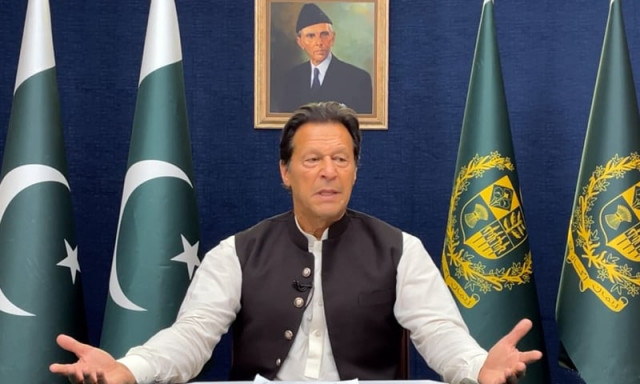IHC dismisses treason plea against Imran Khan, others
CJ Minallah says all citizens are considered patriots unless declared traitors by courts

The Islamabad High Court (IHC) on Monday dismissed a petition seeking registration of a treason case against former prime minister Imran Khan and ex-ministers. IHC Chief Justice Athar Minallah delivered a reserved verdict, wherein Advocate Maulvi Iqbal Haider, the petitioner, was also fined Rs100,000.
The petition filed under Article 199 of the Constitution of Pakistan had sought treason proceedings against Pakistan Tehreek-e-Insaf (PTI) Chairman Imran Khan, Vice Chairman Shah Mahmood Qureshi, Spokesperson Fawad Chaudhry, senior party leader Qasim Khan Suri and Pakistan’s envoy to the United States.
The petitioner also sought investigation into the diplomatic dispatch which alleges ‘foreign conspiracy to oust the Imran Khan government and inclusion of the said persons’ names in the no-fly list.
In its verdict, the court noted that the diplomatic dispatch was placed before the National Security Committee (NSC), which was apparently satisfied that no further investigation was needed.
The CJ noted that the frivolous petition was an attempt to make the cable controversial. He pointed out that making diplomatic cables controversial is against public interest and national security because making them subject to political debate or litigation affects the credibility of Foreign Office’s (FO) work.
The senior judge also mentioned that bringing “informal diplomatic talks” into the public domain is likely to damage Pakistan’s image and foreign policy.
Read: Imran Khan sends diplomatic cypher to CJP
The court ruled that the petition contained outdated allegations against the former premier, noting that it was the responsibility of every citizen to ensure that national security was not politicised or sensationalised.
Under Article 199 of the Constitution, the judge declared, the hearing could not be conducted using extraordinary jurisdiction. He said that petitioners are not aware of the importance of diplomatic cables sent by Pakistani diplomats of the countries concerned, as these communications are very important and their access is limited.
He added that diplomats are assured that their analysis will not be made sensational or politicised. He further said that diplomats are obligated to share their findings and analysis with the countries they represent, and the diplomatic cable in question was sent by a competent diplomat.
The court said that the FO should look into such sensitive and complex matters instead of bringing them into the court.
CJ Minallah also noted that every citizen is considered a patriot and loyal to state unless a court declares them a traitor.
During the hearing, the top judge also remarked that Imran Khan was an elected prime minister and should not be compared with former military dictator General (r) Pervez Musharraf.
Earlier it was reported that despite serious concern from the legal wing, former premier Imran sent the FO cypher to Chief Justice of Pakistan (CJP) Umar Ata Bandial, claiming that a foreign country sent a threatening message through Pakistan’s envoy.
Sources told The Express Tribune that there is a possibility that the CJP may not read the diplomatic cypher.
It was being reported that a US official had warned that there could have been implications if Imran had survived the opposition’s no-confidence motion in the National Assembly (NA).
An emergency petition was also filed in the IHC on Saturday, seeking to restrain then-prime minister Imran from de-notifying Chief of Army Staff (COAS) General Qamar Javed Bajwa.



















COMMENTS
Comments are moderated and generally will be posted if they are on-topic and not abusive.
For more information, please see our Comments FAQ